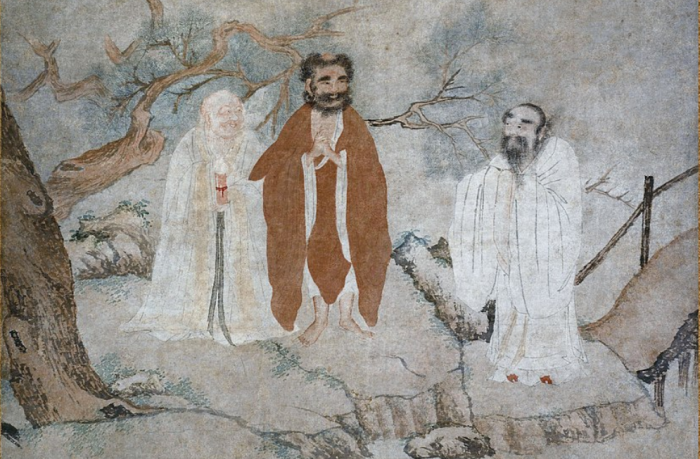Growing up, I heard many arguments between my parents.
Most of them happened at night in our kitchen. My father’s rage and my mother’s cries would crash through the silence of the hallway, slip under the crack of the bedroom door, and land in my imagination where my little-girl mind made up stories that usually ended with my father killing my mother.
Since then, life has taught me that if I am to heal my dysfunctional behavior in the present, I must fearlessly search my past for clues of where it began. When I first came across this Lao Tzu quote, I knew it was a powerful medicine that would help me heal.
“Do you have the patience to wait till your mud settles and the water is clear? Can you remain unmoving till the right action arises by itself?”
I read it. Reread it. Posted it on my fridge. Committed it to memory. Imagined muddy waters clearing. I pondered it during long walks, but it wasn’t until Earth school served up a problem that I was invited to live its 2600-year-old wisdom.
Recently, someone I love shared information with me that stirred up old feelings of distrust and jealousy. The information he shared, mixed with my past experiences of him and myself, triggered a familiar sensation of fear in my solar plexus—a sort of squeezing, a gnawing, a sick feeling, accompanied by a slight buzzing at the back of my head.
As we sat across from each at my kitchen table, I felt as though I was losing emotional balance. I wanted to right my thinking, to believe that in that moment, I was safe and that there was nothing to fear. Inside my body, my nervous system was going berserk. The fight, flight, or freeze alarm had been flipped. I was in full trigger mode. The physical sensation was a replica of what I’d felt as a little girl when my parents fought.
I continued to listen to him and asked clarifying questions while my mind spun a story of some future time, and in that future time, I’d be feeling betrayed and hurt. I attempted to deepen my breathing in an effort to calm my thoughts, but my physical discomfort was hijacking my sense of reality. Although my body was in the chair, I was no longer present to him or myself.
How could a conversation bring on such debilitating emotions and discomfort in my body? My mind was working against me. My thoughts and beliefs were terrorizing me.
Thankfully, he had to leave, but seeing the panic on my face, asked if I’d like to continue the conversation that evening.
“I’m not sure,” I said. This was as close as I could get to my truth.
In the past, when in trigger, I would immediately look to the cause (usually another person) to eliminate my anxiety. I believed that since it is the other person’s actions or words that caused me to be upset, I would have to verbally and emotionally spar with them in order to feel better. Inevitably, a power struggle would ensue. Someone would lose, get hurt, or walk away feeling shamed, silenced, and small.
As I held the phone in my hand that night, I questioned the wisdom of trying to resolve anything while in my unsettled emotional state. Lao Tzu’s quote bubbled up. “Do you have the patience to wait till your mud settles and the water is clear? Can you remain unmoving till the right action arises by itself?”
I sent a text: “I’m feeling quite full from our conversation and need to take care of myself. Let’s talk tomorrow.”
I made a choice to not react while my nervous system was on high alert.
Sleep was broken that night and I spent the following day in introspection, writing, walking, calling a trusted friend, and attending a 12-step meeting.
I took care of myself. I waited for the mud to settle, knowing that unless I did, I would not be able to hear my inner wisdom over the roar of anxiety. I did not pick up the phone. I waited and waited for the water to clear, for my solar plexus to relax, for my thoughts to calm, and for clarity to return.
Unlike that little girl under the duvet, I could be there for myself.
Learning to recognize when we are in trigger is the first step toward healing.
It begins with getting clear about what emotions are arising, by saying: I am feeling anxious, afraid, angry, indignant, rejected, worried, confused, abandoned, or whatever other feelings might be coming up for us.
Next is noticing where these emotions show up in our bodies.
Is it a squeeze in the solar plexus? A constricted throat? Tingling at the back of our head? Tightness in our chest? Sit with each emotion without judging its validity. It is arising, therefore, it is valid.
The next step is to slow everything down.
Consciously slow down your breathing. Make the exhale twice as long as your inhale. This is the fastest way to disarm our triggered nervous systems. Sit with the breath for five or 10 minutes. Observe the mind slowing down.
Change your surroundings.
If possible, take yourself out for a walk. Pay attention to the way your feet strike the ground, name the sounds around you, what your gaze lands on, the colors you see. Focus on one thing at a time.
Continue to connect with your feelings.
Ride out the emotions and when they feel overwhelming, remind yourself that each emotion takes about 90 seconds to rise, crest, and recede. Give the anxiety space and time to burn itself out.
Lao Tzu’s quote is teaching me that when I feel that there is no way out, the answer is to go in and to remember that in order for wisdom to meet the problem, it must first flow through stillness.
I called the following evening. We had a conversation rooted in curiosity and respect for ourselves and each other. I exercised courage and voiced my boundaries. I did not manipulate or employ ultimatums to create a false sense of safety. I kept an internal eye on my body that I trusted would signal me if I headed off course in my authenticity and integrity. I hung up the phone feeling self-empowered and centered.
Today, I am no longer that frightened little girl hiding under the covers. I do not have to react with the same tools I had used to keep myself safe.
Today, I have a choice. I have a voice. I can wait for the mud to settle, for the water to clear, for the wisdom to arise.
~
 Share on bsky
Share on bsky






Read 30 comments and reply